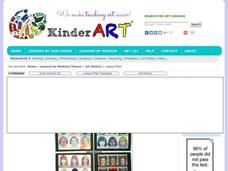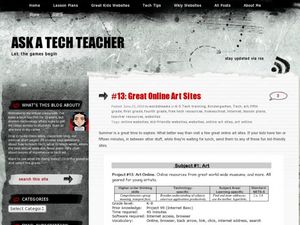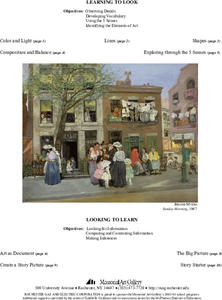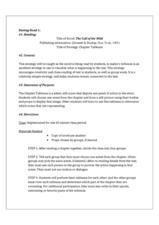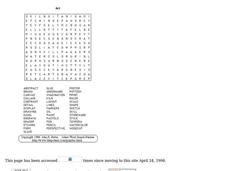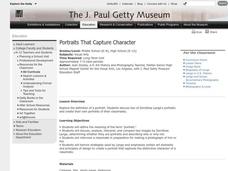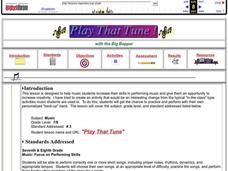Curated OER
Warhol "Pop Art" Portraits
Learners create self-portraits in "Pop-Art" style using repetition, bright colors, and their knowledge of Andy Warhol and his artwork in this 4th through 6th grade Art lesson plan. Included with the lesson plan is a short vocabulary...
Curated OER
Art and Culture
Students compare and contrast the ways in which human figures are portrayed in rock art made by ancient Native American artists and in the drawings and paintings of historic European and American artists. They use images to identify...
Curated OER
Mondrian Inspired Abstract Art
Learners explore the art of Piet Mondrian. In this abstract art lesson, students look at paintings by the Dutch painter and then follow the provided steps to create their own abstract art inspired by his works.
Curated OER
Great Online Art Sites
Students complete an online study of art websites. In this art and technology instructional activity, students explore the links and try the activities to learn about art online.
Curated OER
Colored Sand Art
Students trace images on paper with glue and then sprinkle on colored sand they have made to create sand art pictures.
Curated OER
Art Words Word Search
In this art word search worksheet, students study the list of 54 art terms and locate them in the word search in order to solve the puzzle.
Curated OER
Look, Listen and Learn
Students brainstorm what they know about the performing arts and research an artist or song and its related genre. Students work in groups to create an online banner to attract peers to their performing arts genre.
Curated OER
Natural Collaboration: Building With the Five Elements of Art
Students assemble found natural objects into an artistic arrangement. They photograph their arrangement and Photoshop to enhance their artwork.
Curated OER
Carerrs in Song And Dance
Students write a job posting for a career in the performing arts. They view a Discovery Channel video as an introduction to the types of performing art careers are possible. They choose one that they are most interested in to research on...
Curated OER
Looking and Learning in the Art Museum - Lesson 1
Explore the artistic elements in artworks with an original and reproduction instructional activity. As learners recognize the difference between an original and a reproduction, they discuss the artist elements used in the...
Curated OER
Carnival of the Animals and Aquarium and Magic Fish
Engage little learners in this moderately developed three-lesson unit on the composer Camille Saint-Saens and his piece "The Carnival of Animals." Each lesson includes a listening, discussion, and an art project to engage your class in...
Curated OER
Grand Canyon Suite
Take a trip to the Grand Canyon! Lesson one explores how Ferde Grofe painted a musical landscape of America when he wrote the Grand Canyon Suite. Learners then examine art that shows the Grand Canyon in activity two. Finally, activity...
Memorial Art Gallery
Learning to Look, Looking to Learn - Sunday Morning
Jerome Myers' depiction of the urban landscape in "Sunday Morning" is the focus of a series of activities that asks viewers to examine how an artist uses the elements of a painting to tell a story. The resource packet includes an...
Curated OER
Chapter Tableaux: Visualizing The Call of the Wild
Do your young readers have difficulty visualizing what they read? Although the activity described here is for The Call of the Wild, the strategy could be used with any narrative. At the conclusion of each chapter of Jack London’s novel,...
Sargent Art
Improvisation: Dada and Surrealism
Images of works by Salvador Dali, Luis Bunuel, and Man Ray launch a study of Dada and Surrealism. After critiquing works by these and other artists, class members gather their own images and arrange them into a cohesive composition.
Maryland Department of Education
The Concept of Identity Lesson 8: Propaganda in Visual Media
Visual and print propaganda are featured in a lesson that asks readers of A Separate Peace to examine the techniques used in propaganda from World War I, World War II, presidential elections, and in the novel.
Sargent Art
Facial Proportion Challenge: Freaky Faces
Young artists have fun making freaky faces when they accept the challenge of making proportional portraits. They must find pictures in magazines, cut out two eyes, a nose, and a mouth, and then rescale these images into a portrait.
Curated OER
Art
In this art worksheet, students identify, view and discuss forty key terms associated with art and then circle each key term in a word search puzzle.
J. Paul Getty Trust
Portraits That Capture Character
One of the great things about technology is that it lets youngsters visit museums that may be many miles away. With this resource, middle and high schoolers can visit the portrait galleries at J. Paul Getty Museum, located in Los...
Curated OER
Lesson: Mary Heilmann: To Be Someone
Kids consider the pure abstraction and minimalism found in Mary Heilmann's work. They analyze several of her pieces through critical discussion and then think about her use of a song title as the title of her exhibit. Learners then use a...
Curated OER
Name That Tune
Integrating technology and music can be a snap with lessons like this one! Kids in a junior high band class took to the Internet to download and practice playing their instrument with a computer generated back up band. They practice...
Curated OER
Lesson: Elizabeth Peyton: Artist's Community: The Real
What is real or imagined? The lines of beauty reality, and imagination are blurred in Elizabeth Peyton's portraits of her community. Learners analyze her use of artistic technique in conveying real and imagined communities. They then use...
J. Paul Getty Trust
O Greek Shape! O Fair Pose!
Everything old is new again. The Los Angeles J. Paul Getty Museum presents a activity on how Greek black-figure painting influenced eighteenth century Neoclassical artists. After looking at a series of examples, class members create...
Curated OER
Visual Aural Impressions
Students view a piece of impressionist art, listen to a piece of jazz music and then write a piece about the picture in the style of beat poets. They compare their writing and look for differences in their perceptions.


